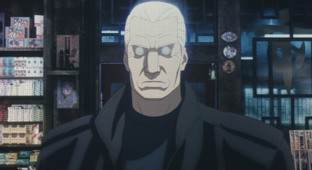|
Mamoru Oshii is one of the key figures in modern Japanese
anime, having created the extraordinary Ghost in the
Shell (Kôkaku kidôtai, 1995)
and made probably the only (so far) near perfect live action
live action anime in Avalon in 2001. Since
the release of that film, a darkly brilliant melding of Japanese
comic book structure and story with an East European visual
sense, tinged with elements of Cronenberg and Lynch,
all eyes here have been on what he would do next. Animation,
live action, or both? Oshii has returned to animation, and
more directly his most acclaimed film, Ghost in the
Shell. The title may not give this away, but Innocence is essentially a sequel to that film (its original title was
to be simply Ghost in the Shell 2). And it's
quite something.
Batou
is a cyborg, a human with a robotic body, giving him enhanced
strength and combat abilities. In a time where the difference
between what is human and what is robotic has become blurred,
Batou hangs on to a memory, a vision of a woman, for whom
he searches in the hope of reclaiming his own sense of what
it is to be human.
Just
as Avalon mixed computer animation with live
action, Innocence has traditional, cell-drawn
2D characters interacting with complex, computer generated
3D backgrounds. Whereas in Avalon the mix
made perfect narrative sense – the characters were taking
part in a computer game, and the artificiality of some of
the graphics was very deliberate and effective – here the
choice is purely a stylistic one, and whether it works or
not will depend very much on taste. I found the effect at
first a tad jarring – the opening shot is a magnificent, 3D
cityscape, and the first appearance of the cell-drawn characters
comes as a real surprise after this – but soon warmed to it
and in a short space of time began to enjoy the mix a great deal.
As you'd expect, some of the computer generated images are
genuinely gobsmacking, but this should not take away from
the excellent work visible in the cell animation – just watch
Batou unstrap a girl from a pod in which she has been trapped
and look how every move of his and her body has been realistically
rendered.

Complimenting
the visuals is a rich and atmospheric DTS soundtrack, the
star of which is an excellent score by Avalon composer Kenji Kawai, who also composed the memorably frightening
music for Ringu and Dark Water.
Full of sinister chords and rhythmic chants, it is as much
a part of the film's feel and structure as the visuals.
Innocence draws on many sources, including its on film lineage. Ghost
in the Shell and Avalon are both
referenced heavily, in character, design and plot elements,
as well as pacing and a compelling use of stillness punctuated
by sudden action, but you will also find elements of Blade
Runner, The Matrix, Robocop,
William Gibson's Neuromancer trilogy, and even the Final
Fantasy computer game series. It's a heady mix that for
the most part plays seamlessly, and amidst the brooding dialogue
scenes and dark cityscapes, there are bursts of sometimes
electrifying violence and action in the traditional anime
style – Batou enters a bar and everyone has just enough time
to reach for their weapons before the entire place is sprayed
by his machine gun.
The
film reaches a satisfying conclusion, and if the end seems
a little tidy (with the hint of something darkly remembered),
then the journey there is as dark and sometimes intense as
anything in recent anime, and the complete flipside of the
revoltingly jolly, song-infested animation of Disney's recent
output. This is a true cyberpunk movie, and one destined to
follow both Ghost in the Shell and Avalon into cult status.
This
is a preview rather than a full review for two reasons – the
film has not yet been released in the UK and as yet is waiting
for an official release date, and the print viewed was a Japanese
one with no subtitles. I know enough of the language to follow
the plot and some of the dialogue, but am nowhere near fluent
enough to understand the more detailed intricacies of the interaction
between the characters, and without this it is impossible
to fully judge the film. As for a UK and US release, this
seems to have been designed in from the ground up – the opening
credits are in English, as are most of the on-screen computer
graphics, suggesting that a western release has been planned from the start, as just by dubbing the voices (and in animation,
lip synchronisation is rarely an issue) the film would be
ready for a western release. But I do hope the original Japanese
version will also become available. The voice work here is particularly key to the characters, and the thought of Batou's deep, gravelly voice being replaced by an American "Hey you guys!" type one really fills me with horror.
|